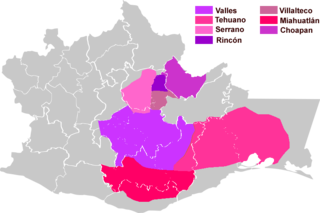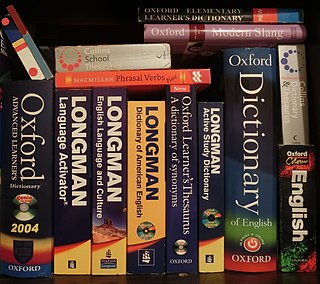Related Research Articles
In linguistics, a copula is a word or phrase that links the subject of a sentence to a subject complement, such as the word is in the sentence "The sky is blue" or the phrase was not being in the sentence "It was not being used." The word copula derives from the Latin noun for a "link" or "tie" that connects two different things.
Aspect is a grammatical category that expresses how an action, event, or state, denoted by a verb, extends over time. Perfective aspect is used in referring to an event conceived as bounded and unitary, without reference to any flow of time during. Imperfective aspect is used for situations conceived as existing continuously or repetitively as time flows.
Infinitive is a linguistics term for certain verb forms existing in many languages, most often used as non-finite verbs. As with many linguistic concepts, there is not a single definition applicable to all languages. The word is derived from Late Latin [modus] infinitivus, a derivative of infinitus meaning "unlimited".
In the philosophy of language and linguistics, speech act is something expressed by an individual that not only presents information but performs an action as well. For example, the phrase "I would like the kimchi, could you please pass it to me?" is considered a speech act as it expresses the speaker's desire to acquire the kimchi, as well as presenting a request that someone pass the kimchi to them. According to Kent Bach, "almost any speech act is really the performance of several acts at once, distinguished by different aspects of the speaker's intention: there is the act of saying something, what one does in saying it, such as requesting or promising, and how one is trying to affect one's audience". The contemporary use of the term goes back to J. L. Austin's development of performative utterances and his theory of locutionary, illocutionary, and perlocutionary acts. Speech acts serve their function once they are said or communicated. These are commonly taken to include acts such as apologizing, promising, ordering, answering, requesting, complaining, warning, inviting, refusing, and congratulating.
An auxiliary verb is a verb that adds functional or grammatical meaning to the clause in which it occurs, so as to express tense, aspect, modality, voice, emphasis, etc. Auxiliary verbs usually accompany an infinitive verb or a participle, which respectively provide the main semantic content of the clause. An example is the verb have in the sentence I have finished my lunch. Here, the auxiliary have helps to express the perfect aspect along with the participle, finished. Some sentences contain a chain of two or more auxiliary verbs. Auxiliary verbs are also called helping verbs, helper verbs, or (verbal) auxiliaries. Research has been conducted into split inflection in auxiliary verbs.
In language, a clause is a constituent that links a semantic predicand and a semantic predicate. A typical clause consists of a subject and a syntactic predicate, the latter typically a verb phrase, a verb with any objects and other modifiers. However, the subject is sometimes not said or explicit, often the case in null-subject languages if the subject is retrievable from context, but it sometimes also occurs in other languages such as English.
In grammar, a future tense is a verb form that generally marks the event described by the verb as not having happened yet, but expected to happen in the future. An example of a future tense form is the French aimera, meaning "will love", derived from the verb aimer ("love"). The "future" expressed by the future tense usually means the future relative to the moment of speaking, although in contexts where relative tense is used it may mean the future relative to some other point in time under consideration.
This article outlines the grammar of the Dutch language, which shares strong similarities with German grammar and also, to a lesser degree, with English grammar.
The past tense is a grammatical tense whose function is to place an action or situation in the past. Examples of verbs in the past tense include the English verbs sang, went and washed. Most languages have a past tense, with some having several types in order to indicate how far back the action took place. Some languages have a compound past tense which uses auxiliary verbs as well as an imperfect tense which expresses continuous or repetitive events or actions. Some languages inflect the verb, which changes the ending to indicate the past tense, while non-inflected languages may use other words, such as "yesterday" or "last week" to indicate that something took place in the past.
The perfect tense or aspect is a verb form that indicates that an action or circumstance occurred earlier than the time under consideration, often focusing attention on the resulting state rather than on the occurrence itself. An example of a perfect construction is I have made dinner. Although this gives information about a prior action, the focus is likely to be on the present consequences of that action. The word perfect in this sense means "completed".
The continuous and progressive aspects are grammatical aspects that express incomplete action or state in progress at a specific time: they are non-habitual, imperfective aspects.

The English modal verbs are a subset of the English auxiliary verbs used mostly to express modality. They can be distinguished from other verbs by their defectiveness and by their neutralization.
A modal verb is a type of verb that is used to indicate modality – that is: likelihood, ability, permission, request, capacity, suggestions, order, obligation, or advice. Modal verbs always accompany the base (infinitive) form of another verb having semantic content. In English, the modal verbs commonly used are can, could, may, might, shall, should, will, would, and must.
In linguistics, irrealis moods are the main set of grammatical moods that indicate that a certain situation or action is not known to have happened at the moment the speaker is talking. This contrasts with the realis moods.
In linguistics, a resultative is a form that expresses that something or someone has undergone a change in state as the result of the completion of an event. Resultatives appear as predicates of sentences, and are generally composed of a verb, a post-verbal noun phrase and a so-called resultative phrase which may be represented by an adjective, a prepositional phrase, or a particle, among others. For example, in the English sentence The man wiped the table clean, the adjective clean denotes the state achieved by the table as a result of the event described as the man wiped.
Adang is a Papuan language spoken on the island of Alor in Indonesia. The language is agglutinative. The Hamap dialect is sometimes treated as a separate language; on the other hand, Kabola, which is sociolinguistically distinct, is sometimes included. Adang, Hamap and Kabola are considered a dialect chain. Adang is endangered as fewer speakers raise their children in Adang, instead opting for Indonesian.
Tense–aspect–mood or tense–modality–aspect is a group of grammatical categories which are important for the understanding of spoken or written content and which are marked in different ways by different languages.

Yatzachi Zapotec is an Oto-Manguean language of the Zapotecan branch, spoken in northern central Oaxaca, Mexico. 2,500 self-reported being Yatzachi speakers for the 1990 Mexican census, but the actual number of speakers is unknown. The Yatzachi dialect belongs to the Villa Alta group of Zapotec dialects, of which the main dialect is San Bartolomé Zoogocho. The degree of mutual intelligibility between Yatzachi and the San Bartolomé Zoogocho dialect is estimated to be around 90 percent.

This article describes the uses of various verb forms in modern standard English language. This includes:
References
- ↑ de Groot, Casper (2000). "The absentive". In Dahl, Östen (ed.). Tense and aspect in the languages of Europe . Berlin: Mouton de Gruyter. pp. 641–667.
- ↑ Garachana, Mar (7 March 2014). "absentive". diccionari linguistica. Universitat di Barcelona. Retrieved 21 July 2014.